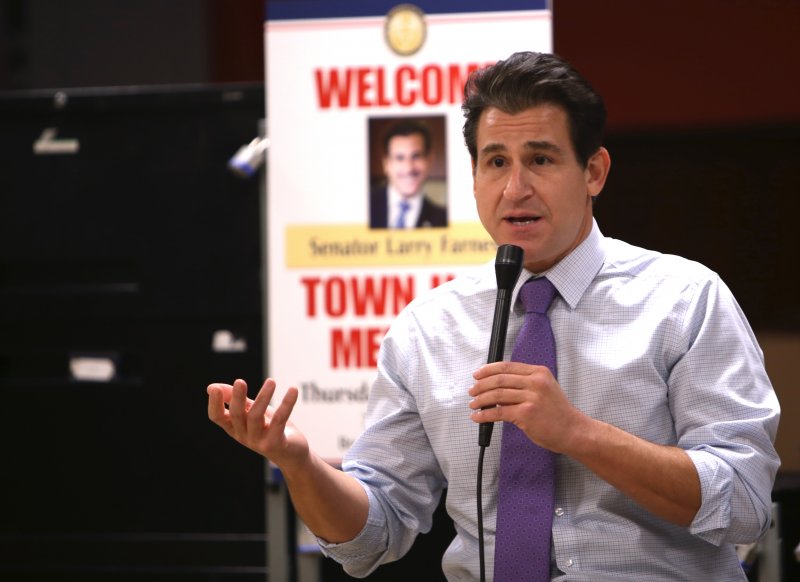A federal jury this week acquitted State Sen. Lawrence M. Farnese Jr. of all charges related to his alleged bribe of Ellen Chapman five years ago to help advance his political career.
After deliberating about four hours, the 12-member jury returned its not-guilty verdict Feb. 1.
Chapman, an Eighth Ward committee person, also was cleared of all charges.
Chapman’s attorney, Elizabeth L. Toplin, issued this statement: “On behalf of Ms. Chapman, we’d like to thank the jury for their service. We believe that justice was served.”
Farnese couldn’t be reached for comment, as of presstime.
Farnese and Chapman were accused of various crimes relating to bribery, fraud and conspiracy. Their federal trial took place between Jan. 23-Feb. 1 in Center City. Numerous supporters of Farnese were in attendance, including his mother.
In his closing argument Jan. 30, Assistant U.S. Attorney Robert J. Heberle told jurors that Farnese wanted to “consolidate” his political power by becoming Democratic leader of the Eighth Ward.
The Eighth Ward is a political subdivision, largely in Center City west of Broad Street. One of its main functions is to encourage local Democrats to vote in elections.
Heberle said Farnese bribed Chapman by paying $6,000 toward the tuition of her daughter, Hannah Feldman. In return, Chapman allegedly agreed to vote for Farnese as ward leader.
But defense attorneys scoffed at the prosecution’s version of events. They said Farnese had the December 2011 ward-leader election “sewn up,” and that Chapman didn’t even vote for him.
Prosecution witnesses testify
Two government witnesses, Theodore B. Mucellin and Stephen N. Huntington, provided testimony that prosecutors say demonstrated Farnese bribed Chapman during a May 18, 2011, phone conversation.
Huntington and Mucellin weren’t present during the conversation at issue, but they subsequently heard about it from Chapman and/or Farnese, according to prosecutors.
Mucellin was a political aide to Farnese at the time of the alleged bribe, and Heberle described him as a “middleman” who helped facilitate the bribe.
Mucellin testified under an immunity agreement, and avoided criminal charges.
According to Huntington’s testimony, Chapman conveyed to him that she couldn’t support his ward-leader candidacy. If she did, Farnese wouldn’t help fund her daughter’s education.
Mucellin testified that he had a phone conversation with Chapman shortly after the alleged bribe, during which she reiterated her support for Farnese as ward leader.
Heberle said the testimony of Mucellin and Huntington helped demonstrate that a bribe caused Chapman to agree to support Farnese for the ward-leader post, rather than Huntington.
But defense attorneys noted that Huntington never was a serious contender for the ward-leader post. They also pointed out that Mucellin and Huntington don’t have firsthand knowledge of what was said during the May 18, 2011, phone conversation.
Five-day period examined
Throughout the trial, defense attorneys chipped away at the prosecution’s theory that a bribe took place on May 18, 2011. They noted that Farnese didn’t authorize a $6,000 payment toward Feldman’s education until May 23, 2011 — five days after the alleged bribe.
Heberle said Farnese hoped that alternate funding sources could be obtained between May 18-23, 2011, before finally agreeing to pay the full $6,000 from his senatorial campaign fund.
But defense attorneys insisted the timeline of events supported their clients’ innonence, rather than their guilt.
Chapman’s daughter testifies
Chapman and Farnese didn’t take the witness stand in their defense during the trial. But on Jan. 27, Chapman’s daughter, Hannah Feldman, testified in a passionate, rapid-fire manner in her mother’s defense.
Feldman said there was nothing secretive or unusual about Farnese’s contribution to her education. She freely shared information about it with others, including a student in Florida. The $6,000 payment helped make it possible for her pursue her dream of studying in central Asia, she said.
Outside the courtroom, Feldman emphatically disagreed with the prosecution of her mother and Farnese, calling it “insane.”
Toplin, the attorney for Chapman, told jurors it was natural for Chapman to take into account Farnese’s support for her daughter’s education when deciding to support him for ward leader.
“What happened here is not only legal, there’s nothing immoral about it,” Toplin told jurors.
Toplin also said there’s no proof that Chapman would have voted for Huntington for ward leader, if Farnese didn’t contribute to her daughter’s education.
Constituent service emphasized
Heberle told jurors that Farnese’s $6,000 payment shouldn’t be viewed as anything other than a bribe. He said a careful review of Farnese’s financial records shows that the payment “sticks out like a sore thumb,” due to its size and nature.
But Mark B. Sheppard, an attorney for Farnese, consistently emphasized that Farnese was performing a valid “constituent service” when helping to fund Feldman’s education.
Sheppard described Feldman as “a very deserving young lady,” an honors student who also worked on Farnese’s senatorial campaign.
Sheppard noted that Feldman’s trip to Asia wasn’t some type of “boondoggle” or frivolity such as studying in Paris at the Sorbonne. Sheppard also noted that her father, David Feldman, is a prominent LGBT advocate, whose efforts Farnese greatly appreciates.
Moreover, Farnese comes from a family of educators and values the role of education in society, Sheppard added.
In November, Farnese handily won re-election as state senator. He has a strong record of support for LGBT causes, including a statewide LGBT civil-rights statute and a new probe of the Nizah Morris case.
